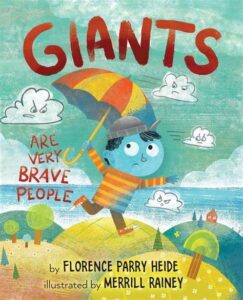1 August 2023
32 pages
This month’s PB review is by Ryan G. Van Cleave (Owner/Operator of Only Picture Books) and freelance illustrator Edna Cabcabin Moran.
–Ryan’s Review of the Writing–
While I was familiar with Florence Parry Heide (1919–2011), the author of over 100 children’s books, I initially didn’t realize that this was a new edition of a 50-year-old work. Realizing that situation now actually answers some of my questions about the book, which are likely a result of audiences being so different a half century ago.
Back to the book, though.…
This is the story of a blue-skinned child named Bigelow. To put it plainly, he’s absolutely a total scaredy-catkid. The clouds could fall on him, after all. And alphabet soup could spell out a magic word that kapoofs him into a mushroom. And rain? Well, of course he’s afraid of rain. Because he might melt.
One day, he goes out for a walk and encounters a very small woman (Mrs. Pimberly) who’s afraid of him because to her, he’s huge. She suggests that he might be less afraid if he acted a bit more fierce–perhaps by giving “a giant short of shout” such as FEE FI FO FUM. While it seems as if Bigelow is the first giant she’s encountered, she says that all giants know that phrase.
Bigelow practices the shout repeatedly while Mrs. Pimberly brews some tea. When she comes out with the tea, Bigelow is LOUD, to which she says, “You certainly scared me. That’s a very good shout. I’m sure it will make you feel much, much braver.”
All that shouting made him hungry, so Mrs. Pimberly makes him a mountain of pancakes (large to her, small to him). After he’s had the tiny snack, he offers to take her home with him, but she declines, saying that she has never traveled or had many experiences. “I’ve never even been on a train,” she says.
Back at home, Bigelow uses FEE FI FO FUM to deal with two of his fears–alphabet soup and bathtime. Maybe acting brave does help someone feel a little braver after all! The kid giant returns the favor to Mrs. Pimberly by bringing her his toy train, which allows her to ride “round and round and round the track.” While it’s unclear how riding a toy train equates to exploring the world, Mrs. Pimberly appears genuinely thrilled with the experience.
Ultimately, I have questions about the story. While children are likely to love shouting FEE FI FO FUM with Bigelow, will they feel less excited that an adult solved/helped solve Bigelow’s problem (being afraid)? Most contemporary picture books give far more agency to kids in stories. I also wonder how a child who is afraid of everything manages to summon courage to go on long walks away from the safety from home.
Yet Rainey’s graphite pencil and digital illustrations are quite charming, as Edna will explain below. I’ve already mentioned the read-aloud-ability of parts of this book, and I’m also charmed by how some readers might not realize how Bigelow is a kid giant until he does himself (which is when he meets Mrs. Pimberly). There’s also a sincerity to the text that still comes through even after 50 years.
All things considered, it’s worthy of a read and an after-book discussion about courage and fear. Great job, Merrill Rainey!
4 out of 5 pencils
–Edna’s Review of the Illustrations–
Merrill Rainey’s digital illustrations in Giants Are Very Brave People bring a freshness and verve to a bygone storytelling style by late bestselling author, Florence Parry Heide. In contrast with the story’s ambling quality, the art is direct and charming as metrical compositions of richly layered pages. Colors and textures sing. Shape and line work dance. Negative space places the main character, Bigelow, center stage in coping with his exhaustive list of fears.
Bigelow ventures (accidentally) into a place outside his fears as Rainey’s colorful artwork starts to fill the pages. Full and half-page compositions take Bigelow and readers onto different vantage points [see pages 5 and 7] where he literally and metaphorically gets a new perspective on things.
He meets Mrs. Pimberly who, in spite of her fear (of giants) begins to befriend Bigelow. She breaks the news to Bigelow that he is a giant and gives advice on how to behave like one. Rainey presents a visual metaphor of Bigelow finding his own voice as a giant. As Bigelow practices his Fee Fi Fo Fum chant [pages 10–11], spot illustrations move across the page spread like musical notes building up to a gigantic crescendo.
A turn to page 12 features a blue person hiding behind a door. It’s not clear right away that this is Mrs. Pimberly as she is painted in flesh tone in the rest of the book. On closer inspection of the text and visuals such as glasses, hairstyle and polka-dot blouse, we realize this blue character is Mrs. Pimberly after all. Whether or not this is an intentional color change is unclear. Taking small pause, however, in a book that tackles the big theme of fear does not detract from the exuberance of Rainey’s tight but loosely rendered, playful yet rigorous artwork.
The scene on pages 30–31, featuring Mrs. Pimberly riding the train that Bigelow set up, is sure to be a favorite among readers. Rainey’s composition of color, shape, line, texture, and expressive animate and inanimate things, result in a tour de force for this picture book. We are not only treated to a visual symphony that resonates with an old-timey tale of Bigelow and Mrs. Pimberly, but we are shown how to be brave in the new millennia.
4.75 out of 5 crayons
 Edna Cabcabin Moran is an author/illustrator, multi-disciplined artist, educator, and advocate for youth voices and diversity in publishing. A Filipina-American born to immigrants and raised in a military family, Edna grew up in the USA’s east and west coasts, Iceland, and Hawai’i. She is also a dancer with acclaimed hālau hula and dance company, Nā Lei Hulu I Ka Wēkiu, and a teaching artist specializing in STEAM and integrative arts. Her latest picture book, Honu and Moa (BeachHouse Publishing), received a 2019 Aesop Accolade from the American Folklore Society.
Edna Cabcabin Moran is an author/illustrator, multi-disciplined artist, educator, and advocate for youth voices and diversity in publishing. A Filipina-American born to immigrants and raised in a military family, Edna grew up in the USA’s east and west coasts, Iceland, and Hawai’i. She is also a dancer with acclaimed hālau hula and dance company, Nā Lei Hulu I Ka Wēkiu, and a teaching artist specializing in STEAM and integrative arts. Her latest picture book, Honu and Moa (BeachHouse Publishing), received a 2019 Aesop Accolade from the American Folklore Society.
IG & Twitter: @kidlitedna


